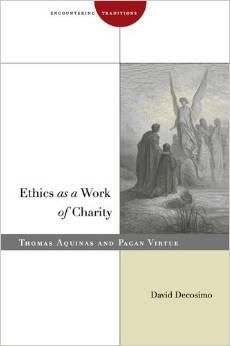Book Review
Ethics as a Work of Charity
Thomas Aquinas and pagan
virtue
David Decosimo
Stanford University Press
ISBN
978-0804790635
 When
it comes to issues like abortion, we appear to have more in
common with "good pagans" than with secularists and liberal
Christians. In this work, the author examines pagan virtues that
inform the good life, specifically turning to Aquinas who took
Aristotelian pagan virtues seriously. They are genuine virtues
and so pagans achieve some degree of goodness. At the same time
there is a clear affirmation of Catholic orthodoxy: virtues
require the action of grace.
When
it comes to issues like abortion, we appear to have more in
common with "good pagans" than with secularists and liberal
Christians. In this work, the author examines pagan virtues that
inform the good life, specifically turning to Aquinas who took
Aristotelian pagan virtues seriously. They are genuine virtues
and so pagans achieve some degree of goodness. At the same time
there is a clear affirmation of Catholic orthodoxy: virtues
require the action of grace.
While the author argues that Aquinas had a respect for pagan virtues, it would appear that some recent Christian philosophers are not so inclined. MacIntyre,for example,perhaps owing to his Augustinian leanings, argues that justice cannot flourish without supernatural charity. Some so-called "hyper-Augustinians" regard non-Christians as incapable of virtue. Morality is possible only for the community of the redeemed according to them. For MacIntyre, late-Western democracies cannot produce people of virtue. For Hauerwas, the Church is needed to form lives oriented away from violence.
In contrast, the author argues that Aquinas welcomes pagan virtues. All of humanity share in sin's brokenness and a desire for good. A capacity for virtue is thus part of what it means to be human. If pagan virtues could flourish in Ancient Greece and Rome where there was slavery and infanticide, there is no reason for them not to flourish in our age of abortion and euthanasia.
This important work shows us how central the virtues are for Aquinas's moral theology.
REVIEWED BY DR PRAVIN THEVATHASAN
